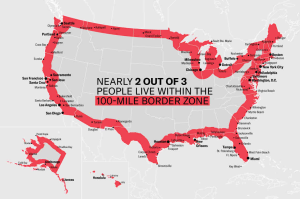Under current U.S. law, federal immigration and customs agents have expanded powers within 100 miles of any U.S. border or coastline. This area—sometimes referred to as the “Constitution-lite zone”—covers roughly two-thirds of the U.S. population, including major cities like New York, Los Angeles, Chicago, and Miami.
In this zone:
-
ICE and CBP can stop, question, and detain individuals without a warrant or typical probable cause.
-
These powers are permitted under federal regulations and have been upheld by courts, though they remain controversial.
-
Critics argue that this undermines constitutional protections, particularly the Fourth Amendment, which guards against unreasonable searches and seizures.
 While the law allows for these actions near the border, many communities inside this 100-mile zone experience enforcement far from the actual border, leading to fears of racial profiling, harassment, and civil liberties violations.
While the law allows for these actions near the border, many communities inside this 100-mile zone experience enforcement far from the actual border, leading to fears of racial profiling, harassment, and civil liberties violations.
Bottom line:
In the 100-mile border zone, the federal government has more authority to stop and question you than in other parts of the country.
